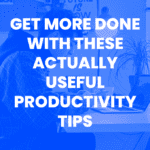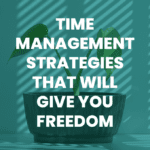Table of Contents
You can’t manage time.
It exists outside of you and goes by without your permission.
Often, focusing too much on time itself causes you to waste time because you’re more concerned about fitting a bunch of tasks into a time window without even considering:
- Whether or not you’re working on the right thing
- If you’re in a mental and physical state to work effectively
- How you structure your tasks affects your most important resource
Your most important resource is energy.
Without the right amount of it, you simply won’t bring yourself to do certain tasks.
How many times have you felt like doing something, but you simply avoided it because you were tired, stressed, or burnt out?
Learn how to manage your energy instead.
Life happens…
I started writing when I was 25 years old. I had a girlfriend, but wasn’t married nor did I have a child. I worked a second shift job. I wrote pretty much every day, but I had no real structure.
I’d write when I felt like it. Since I had so much free time and a younger body, I could read for hours, write, and work a 10-hour shift standing up and walking around the entire time—no problem.
After work, which usually ended around midnight, I’d head over to taco bell and eat a half dozen tacos with a sprite to drink. I’d go to bed at 3 a.m. and sleep…I don’t know how many hours. I’d wake up fresh and ready to do it all over again.
As I got older and my life circumstances changed, so did my energy. Instead of a second shift job, I had a 9 to 5 job and an hour-long round-trip commute.
Instead of an abundance of time, I had a wife, an infant child, and a full-time job. If I were to eat taco bell in a day, my energy would be totally sapped.
I had to learn how to take care of my body and make sure I could maintain my writing habit even though I had much less time to write, much higher demands on my energy, and a gigantic pile of stress I didn’t have years back.
Most people are in this situation. Many people want to start new projects or launch a side hustle, but they’re just burnt out by the end of the day and don’t want to work on anything, which keeps them stuck in a stressful situation that continues to deplete their energy.
Here’s how to fix this and structure your life in a way that helps you reach your goals by managing your energy effectively.
Managing your energy gas tank
You want to do your most challenging work when you have the most energy.
Think of your energy like a gas tank. When the day begins, your energy tank is full. Or, as full as it can be. As I’ll explain, a lot of people live in a way that keeps them at a deficit even as the day is just getting started.
As you go through your day, your energy gets depleted and your willpower reduces. Each task you do takes energy. Each decision you make takes energy as well as thinking about which decisions to make.
Then there are the everyday stressors and annoyances of life like traffic, annoying clients or customers at work, personal tiffs, you name it. Last, there’s a certain device you use all the time that can be very taxing on your brain.
So, by the end of the day, people are usually wiped.
And since their willpower is so low they often engage in counterproductive activities:
- Watching hours of T.V.
- Eating processed foods (especially if too drained to cook)
- Spending even more time on that nasty device
They’re attempting to rest, but they’re not even fully resting. They’re distracted, filled with bad food, and spiking different chemical receptors in their brain right before bed. They get poor sleep, wake up tired, and the cycle repeats itself.
Here’s how to get your most important work done.
Get more effective work done with this simple tip
For the vast majority of people who have important work they want to accomplish, I suggest they do it first thing in the morning.
Personally, I’d always be too tired to work on my writing after getting up to get my toddler ready for daycare, getting ready for work, driving to work, working, driving home, squeezing in a workout, making or helping make dinner, eating dinner, and then spending time with my family.
Instead, I woke up before everyone else was awake so I could write. I’d wake up at about 5 a.m., work for an hour, and then begin the day in earnest. With that hour-a-day habit, I eventually turned my side gig into a full-time job.
A lot of people don’t like to wake up early because they’re not “morning people.”
I never considered myself a morning person and I honestly never quite enjoyed waking up that early. But I did enjoy creating space to be able to effectively work on something that mattered to me.
Waking up early is simply a means to an end. When it comes to productivity strategies, always use them as a means to an end instead of the end itself. Don’t practice energy management for the sake of it. Do it because it’ll allow you to get more important work done.
Some tips for waking up early
- Use the 5-second rule: When your alarm goes off, count down from five and jump out of bed when you hit one.
- No snoozing: It just makes you more tired and trains you to continue to avoid waking up early. Get up when your alarm goes off.
- Put your phone far away from the bed: So, when the alarm goes off, you have to physically stand up to turn off the alarm
If you sincerely consider yourself a night person and can work after the day has concluded, go for it, but give the morning routine a try first.
Step one is making space for important work in the first place. Next, let’s talk about how to work.
The right way and wrong way to work effectively
The way you work, what you work on, how you structure your sessions—all of these things impact your energy.
Most people work in a way that saps them of energy:
- They switch tasks constantly – Take, for example, a writer who will switch from writing to looking up something for an article, to checking social media, to answering their phone. Each time you switch tasks you deplete your energy.
- They don’t prioritize properly – When you treat every task as equal, you’re not effective because different tasks require different levels of energy and have different levels of cognitive demand. Also, avoiding difficult but important tasks causes stress due to judging yourself over procrastination.
- They lack consistency – The more often you block time to work on something important (and commit to that schedule), the easier it is to do it again. If you constantly stop and start and stop and start your routine, it takes a lot of willpower every single session to motivate yourself.
Here’s a better way:
- Zero distractions: This is especially important for cognitively demanding work. Focus on the task at hand and the task alone. If you’re feeling stuck, just sit there and feel stuck instead of doing something else. Eventually, you’ll train yourself to get into a flow state, also known as being “in the zone.”
- Hardest and most important tasks go first: The tasks people avoid are usually the ones that would move the needle in their lives, businesses, career, health, whatever. Choose the most important task, do it first, and deplete your energy to a degree. Then, work on less important and less cognitively demanding tasks as your willpower decreases.
- Create a streak to build momentum: I love this strategy. Buy a calendar and mark an x each day you successfully complete your time block. That visual representation will make you less likely to miss a session the longer the streak grows.
After you get your important work done, treat everything else as “house money.” If you get more stuff done, cool. If not, don’t beat yourself up.
Energy management in all aspects of life
On top of the way I structured my day, I also focused on different strategies to maintain as high an energy level as possible throughout the day.
First things first, prioritizing these three variables down will solve most, if not all, of your energy problems:
- Proper nutrition
- 3x gym per week + daily walks
- 8 hours sleep
After you master these, just focus on what affects your energy and adapt accordingly. Mitigate the negatives and accentuate the positives.
For example, I drink coffee because it gives me a boost, but never more than two cups and I cut myself off very early in the day to avoid being too wired to sleep.
I practice intermittent fasting, which is a fancy way of saying I don’t eat breakfast. I focus better on an empty stomach so I don’t eat until I’ve accomplished my important tasks for the day.
For lunch, I avoid foods with a bunch of carbs to avoid a glucose spike and subsequent crash. I’ll usually hit a workout after lunch and then go back and do more work after that doesn’t require a ton of brainpower like answering emails.
I get to bed by 11 p.m. at the latest. I don’t have a set wake-up time, but I like to go to bed around the same time to ensure a nice rhythm.
On my good days (though I don’t follow this rule every time), I’ll avoid viewing any social media until the afternoon.
You can tinker with this in your own life, but here are my best recommendations to manage your energy well:
Energy management tips
- Turn off notifications on your phone so you have to check the apps themselves to see what’s up
- Avoid watching screens right before bed
- Stop eating fast food
- Don’t watch negative and mentally draining content, like violent news coverage
- Drink less alcohol (it affects your sleep, energy levels, and overall health)
- Quit smoking (if you do)
- Eat foods that boost energy and avoid ones that drain it, mainly meals with heavy fat and heavy carbs
- Meditate for mental clarity
- Try other breathing practices like Wim Hof breathing that are known to increase energy levels
- Avoid being around people who mentally and physically drain you
- Learn to say no and create boundaries
The ultimate goal
I am not a productivity guru.
I don’t focus on optimizing every single aspect of my life.
All of my energy management practices happened organically. I added them to my routine as I found out about them over time. I tried different strategies, kept the ones I liked and discarded the ones I didn’t.
All of these habits, routines, and frameworks were in service of having more energy to:
- Be more effective at my job
- Have more enjoyable time in my days
- Do both of the above for the long haul
I don’t bow to the altar of productivity and I don’t have some meticulously planned out life.
I just get a few simple things right and worked them into my routine until they stuck.
That’s all it takes.
All these strategies are nothing more than a means to an end: to have more energy to live a better life.
Related:







